情态动词表推测的讲解及练习题 (2)
初中英语语法之表推测情态动词用法和练习
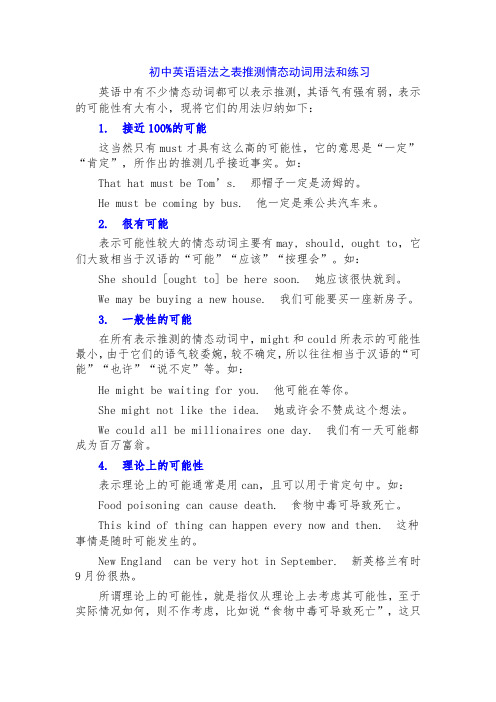
初中英语语法之表推测情态动词用法和练习英语中有不少情态动词都可以表示推测,其语气有强有弱,表示的可能性有大有小,现将它们的用法归纳如下:1. 接近100%的可能这当然只有must才具有这么高的可能性,它的意思是“一定”“肯定”,所作出的推测几乎接近事实。
如:That hat must be Tom’s. 那帽子一定是汤姆的。
He must be coming by bus. 他一定是乘公共汽车来。
2. 很有可能表示可能性较大的情态动词主要有may, should, ought to,它们大致相当于汉语的“可能”“应该”“按理会”。
如:She should [ought to] be here soon. 她应该很快就到。
We may be buying a new house. 我们可能要买一座新房子。
3. 一般性的可能在所有表示推测的情态动词中,might和could所表示的可能性最小,由于它们的语气较委婉,较不确定,所以往往相当于汉语的“可能”“也许”“说不定”等。
如:He might be waiting for you. 他可能在等你。
She might not like the idea. 她或许会不赞成这个想法。
We could all be millionaires one day. 我们有一天可能都成为百万富翁。
4. 理论上的可能性表示理论上的可能通常是用can,且可以用于肯定句中。
如:Food poisoning can cause death. 食物中毒可导致死亡。
This kind of thing can happen every now and then. 这种事情是随时可能发生的。
New England can be very hot in September. 新英格兰有时9月份很热。
所谓理论上的可能性,就是指仅从理论上去考虑其可能性,至于实际情况如何,则不作考虑,比如说“食物中毒可导致死亡”,这只是理论上的一种推断,至于某人某次食物中毒了,他是否会死亡,则不在考虑之列,所以说,这种推测是非常“宏观”的!5. 表示对过去情况作推测如果表示对已经发生的情况作推测,不能用“情态动词+动词原形”,也不能用“情态动词的过去式+动词原形”,而是要使用“情态动词+动词完成式”。
情态动词must__can__could__may__might表推测的用法 (2)

情态动词must, can, could, may, might表推测的用法:情态动词中的must, can, could, may, might都表推测。
其中must的可能性最大,can / could次之,may / might最小。
具体用法如下:1. must的用法(1)表示推测“可能性”时,意思是“一定、准是”,语气较肯定,较有把握。
He must be American. = It is certain that he is American. 他准是个美国人。
(2)must表推测只能用于肯定句。
假如要表示“一定不、肯定不”的意思时,应用can`t,如询问某种可能时,应用can。
He must know my address. 他肯定知道我的地址。
(一定)He can`t know my address. 他肯定不知道我的地址。
(一定不)Can he know my address? 他知道我的地址吗?(询问可能性)(3)must表示推测时,能够推测现在/正在发生的动作/过去发生的动作。
He must have a car now. (现在)他一定有辆小汽车。
He must be doing his exercises in the classroom.(正在实行)他一定在教室里做练习。
He must have finished the work.(过去发生)他一定已完成了工作。
注:must表示推测时很少用于将来的情况。
一般不用He must come tomorrow.可用It`s certain / I`m sure that he will come tomorrow. (4)在反意疑问句中,当附属局部含有表示推测意义的must时,疑问局部的助动词应与must后面的动词在非推测情况下的用法保持一致。
He must be a worker, isn`t he? (现在)他准时个工人,是吗?It must have rained last night, didn`t it? (过去)昨晚一定下雨了,是不是?You must have learned English for many years, haven`t you? (完成时)你一定学了好多年英语,是吗?2. can / could的用法(1)can表示推测“可能性”时,往往用于否认句或疑问句。
情态动词表推测用法总结与专项练习试题
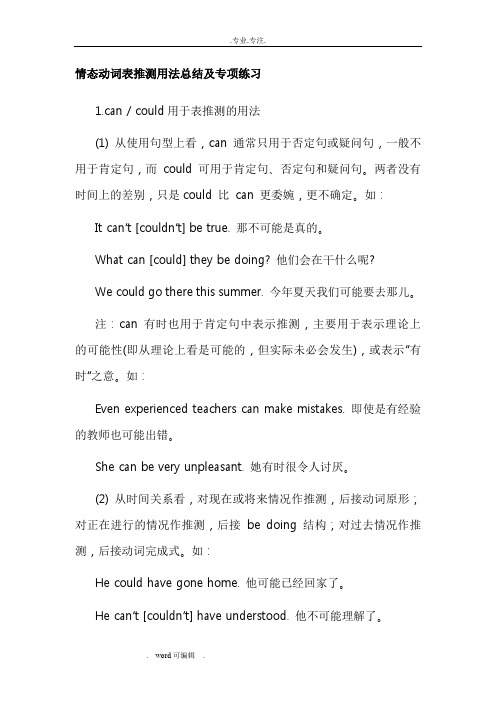
情态动词表推测用法总结及专项练习1.can / could用于表推测的用法(1) 从使用句型上看,can 通常只用于否定句或疑问句,一般不用于肯定句,而could 可用于肯定句、否定句和疑问句。
两者没有时间上的差别,只是could 比can 更委婉,更不确定。
如:It can’t [couldn’t] be true. 那不可能是真的。
What can [could] they be doing? 他们会在干什么呢?We could go there this summer. 今年夏天我们可能要去那儿。
注:can 有时也用于肯定句中表示推测,主要用于表示理论上的可能性(即从理论上看是可能的,但实际未必会发生),或表示“有时”之意。
如:Even experienced teachers can make mistakes. 即使是有经验的教师也可能出错。
She can be very unpleasant. 她有时很令人讨厌。
(2) 从时间关系看,对现在或将来情况作推测,后接动词原形;对正在进行的情况作推测,后接be doing 结构;对过去情况作推测,后接动词完成式。
如:He could have gone home. 他可能已经回家了。
He can’t [couldn’t] have understood. 他不可能理解了。
Why does he know this? Can [Could] someone have told him about it? 他怎么知道? 会是哪个人告诉他了吗?(3) “could+完成式”除表示对过去的推测外,还有以下重要用法:①表示过去没有实现的可能性,常译为“本来可以”。
如:I could have lent you the money.Why didn’t you ask me? 我本来可以借这笔钱给你的。
你为什么不向我提出?②用来委婉地责备某人过去应该做某事而没有去做,常译为“本来应该”。
(完整版)情态动词表推测归纳

情态动词表推测归纳一、can/couldcan和could没有时态上的区别,只是表示可能性的大小,can表示的可能性比could大。
(1)对现在或将来动作或状态的推测The shy girl can’t (couldn’t) be our monitor.这位害羞的女孩不可能当我们的班长。
(2)对过去事实的推测can (could)+have+动词过去分词,表示推测过去某动作“可能”发生了,或者表示过去某动作有可能发生,但未发生,意为“本来可以……”。
can’t (could’t)+have+动词过去分词,表示推测过去动作一定没有发生。
He’s an hour late, and the bad weather can have delayed him.他迟到了一小时,可能是恶劣的天气使他耽误了。
The road isn’t wet. It couldn’t have rained last night.路面没有湿,昨天晚上肯定没下雨。
二、may/might(1)对现在或将来动作或状态的推测She may (might) be washing her clothes.她可能正在洗衣服。
(2)对过去事实的推测A.may/might+have+动词的过去分词,表示推测过去某动作“也许”发生了;might+have+动词的过去分词,表示推测的语气更加委婉。
He says that she may/might have misunderstood him.他说她可能误解他了。
B.may/might+have+been+动词的现在分词,表示推测过去某动作是否正在进行或一直在进行。
He may/might have been buying stamps when you saw him.你看见他时他可能正在买邮票。
三、must(1)对现在动作或状态的肯定推测“must+动词原形”和“must+be+动词现在分词”表示对现在动作或状态的肯定推测;“can’t+不带to的不定式”,表示对现在动作的否定推测,意为“一定没有……”。
情态动词表推测的讲解及练习题
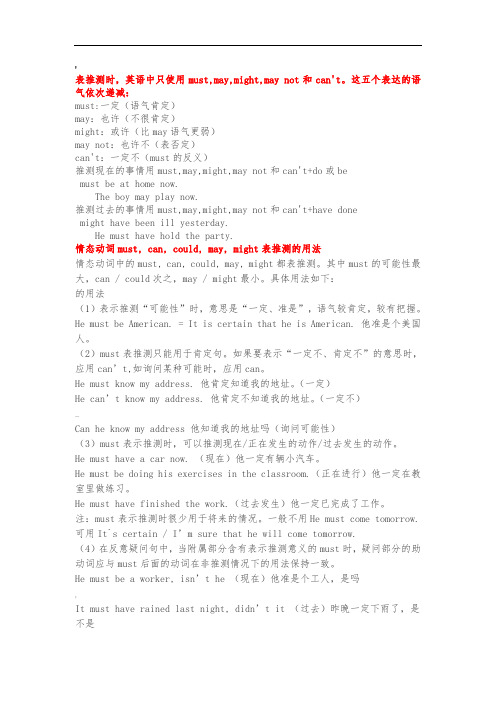
;表推测时,英语中只使用must,may,might,may not和can't。
这五个表达的语气依次递减:must:一定(语气肯定)may:也许(不很肯定)might:或许(比may语气更弱)may not:也许不(表否定)can't:一定不(must的反义)推测现在的事情用must,may,might,may not和can't+do或bemust be at home now.The boy may play now.推测过去的事情用must,may,might,may not和can't+have donemight have been ill yesterday.He must have hold the party.情态动词must, can, could, may, might表推测的用法情态动词中的must, can, could, may, might都表推测。
其中must的可能性最大,can / could次之,may / might最小。
具体用法如下:的用法(1)表示推测“可能性”时,意思是“一定、准是”,语气较肯定,较有把握。
He must be American. = It is certain that he is American. 他准是个美国人。
(2)must表推测只能用于肯定句。
如果要表示“一定不、肯定不”的意思时,应用can’t,如询问某种可能时,应用can。
He must know my address. 他肯定知道我的地址。
(一定)He can’t know my address. 他肯定不知道我的地址。
(一定不)—Can he know my address 他知道我的地址吗(询问可能性)(3)must表示推测时,可以推测现在/正在发生的动作/过去发生的动作。
He must have a car now. (现在)他一定有辆小汽车。
情态动词表推测练习
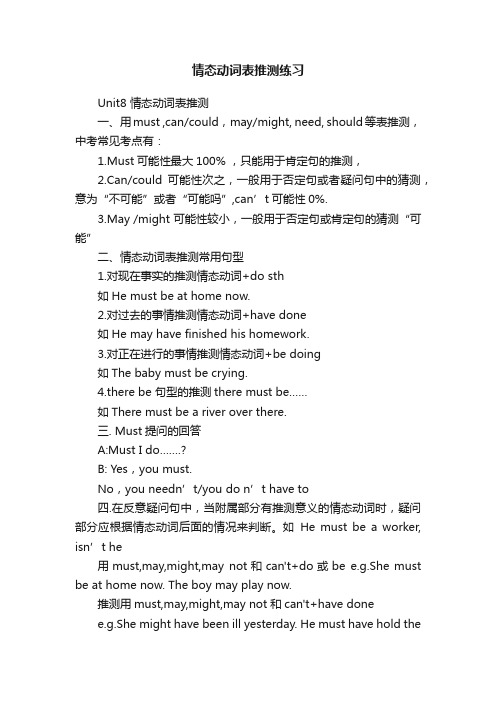
情态动词表推测练习Unit8 情态动词表推测一、用must ,can/could,may/might, need, should等表推测,中考常见考点有:1.Must可能性最大100% ,只能用于肯定句的推测,2.Can/could可能性次之,一般用于否定句或者疑问句中的猜测,意为“不可能”或者“可能吗”,can’t可能性0%.3.May /might 可能性较小,一般用于否定句或肯定句的猜测“可能”二、情态动词表推测常用句型1.对现在事实的推测情态动词+do sth如He must be at home now.2.对过去的事情推测情态动词+have done如He may have finished his homework.3.对正在进行的事情推测情态动词+be doing如The baby must be crying.4.there be 句型的推测there must be……如There must be a river over there.三. Must提问的回答A:Must I do…….?B: Yes,you must.No,you needn’t/you do n’t have to四.在反意疑问句中,当附属部分有推测意义的情态动词时,疑问部分应根据情态动词后面的情况来判断。
如He must be a worker, isn’t he用must,may,might,may not和can't+do或be e.g.She must be at home now. The boy may play now.推测用must,may,might,may not和can't+have donee.g.She might have been ill yesterday. He must have hold theparty. 情态动词must, can, could, may, might 表推测的用法情态动词中的must, can, could, may, might都表推测。
(完整版)情态动词表推测用法总结及练习(可编辑修改word版)
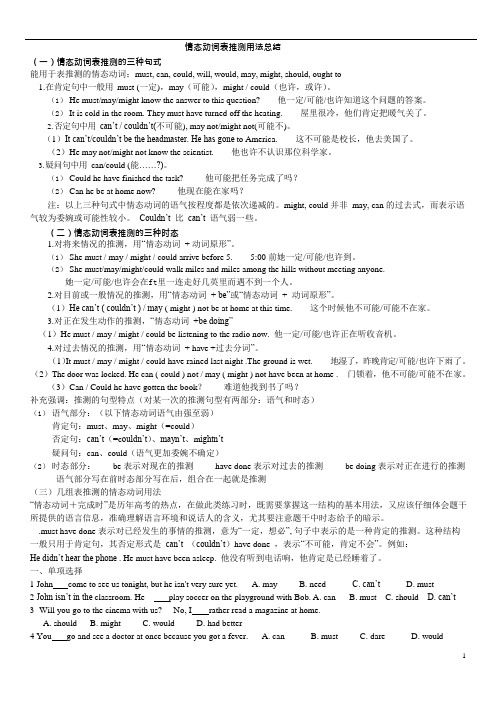
情态动词表推测用法总结(一)情态动词表推测的三种句式能用于表推测的情态动词:must, can, could, will, would, may, might, should, ought to1.在肯定句中一般用must (一定),may(可能),might / could(也许,或许)。
(1)He must/may/might know the answer to this question? 他一定/可能/也许知道这个问题的答案。
(2)It is cold in the room. They must have turned off the heating. 屋里很冷,他们肯定把暖气关了。
2.否定句中用can’t /couldn’t(不可能), may not/might not(可能不)。
(1)It can’t/couldn’t be the headmaster. He has gone to America. 这不可能是校长,他去美国了。
(2)He may not/might not know the scientist. 他也许不认识那位科学家。
3.疑问句中用can/could (能……?)。
(1)Could he have finished the task? 他可能把任务完成了吗?(2)Can he be at home now? 他现在能在家吗?注:以上三种句式中情态动词的语气按程度都是依次递减的。
might, could 并非may, can 的过去式,而表示语气较为委婉或可能性较小。
Couldn’t 比can’t 语气弱一些。
(二)情态动词表推测的三种时态1.对将来情况的推测,用“情态动词+ 动词原形”。
(1)She must / may / might / could arrive before 5. 5:00 前她一定/可能/也许到。
(2)She must/may/might/could walk miles and miles among the hills without meeting anyone.她一定/可能/也许会在ft里一连走好几英里而遇不到一个人。
2021年初中英语语法知识—情态动词的技巧及练习题附答案(2)
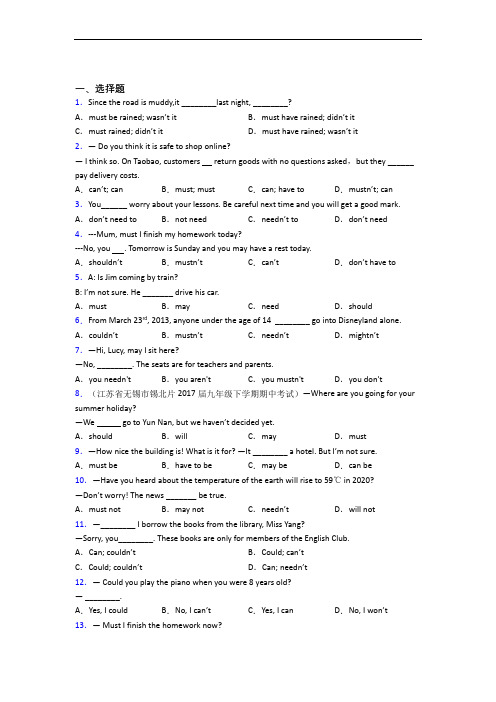
一、选择题1.Since the road is muddy,it ________last night, ________?A.must be rained; wasn’t it B.must have rained; didn’t itC.must rained; didn’t it D.must have rained; wasn’t it2.— Do you think it is safe to shop online?— I think so. On Taobao, customers return goods with no questions asked,but they ______ pay delivery costs.A.can’t; can B.must; must C.can; have to D.mustn’t; can 3.You______ worry about your lessons. Be careful next time and you will get a good mark. A.don’t need to B.not need C.needn’t to D.don’t need4.---Mum, must I finish my homework today?---No, you . Tomorrow is Sunday and you may have a rest today.A.shouldn’t B.mustn’t C.can’t D.don’t have to 5.A: Is Jim coming by train?B: I’m not sure. He _______ drive his car.A.must B.may C.need D.should6.From March 23rd, 2013, anyone under the age of 14 ________ go into Disneyland alone. A.couldn’t B.mustn’t C.needn’t D.mightn’t 7.—Hi, Lucy, may I sit here?—No, ________. The seats are for teachers and parents.A.you needn't B.you aren't C.you mustn't D.you don't 8.(江苏省无锡市锡北片2017届九年级下学期期中考试)—Where are you going for your summer holiday?—We go to Yun Nan, but we haven’t decided yet.A.should B.will C.may D.must9.—How nice the building is! What is it for? —It ________ a hotel. But I’m not sure. A.must be B.have to be C.may be D.can be 10.—Have you heard about the temperature of the earth will rise to 59℃ in 2020?—Don’t worry! The news _______ be true.A.must not B.may not C.needn’t D.will not 11.—________ I borrow the books from the library, Miss Yang?—Sorry, you________. These books are only for members of the English Club.A.Can; couldn’t B.Could; can’tC.Could; couldn’t D.Can; needn’t12.— Could you play the piano when you were 8 years old?— ________.A.Yes, I could B.No, I can’t C.Yes, I can D.No, I won’t 13.— Must I finish the homework now?— .You can do it later.A.No, you needn’t B.Yes, you must C.No, you can’t14.-_________ you help me with my homework?-Of course if I __________.A.Could; could B.Can't; can C.Could; can D.Can; could 15.— Must I go home? — No, you ________.A.can’t B.mustn’t C.don’t D.needn’t 16.–Is Mike coming to the fashion show tomorrow?--I’m not sure. He ______ not come.A.must B.can C.may D.should 17.(2017 • 湖北省宜昌市中考)—Life is becoming convenient with the Internet.—That’s true! Almost everything be done online.A.must B.would C.should D.can 18.—Must I hand in my reports today?—No, you ________.A.mustn’t B.can’t C.shouldn’t D.don’t have to 19.---You look very pretty, if I say so.---Thanks a lot for saying that.A.must B.may C.will D.have to 20.—I often see Maria in the library, and she _________ like reading best.—That’s right.A.need B.may C.must D.can 21.—Could I call you by the first name?—Yes, you .A.will B.could C.may D.might 22.You __ drive your car so fast. It's very dangerous.A.wouldn't B.shouldn't C.couldn't D.mightn't【参考答案】***试卷处理标记,请不要删除一、选择题1.B解析:B【解析】【分析】【详解】句意:由于道路泥泞,昨晚一定下雨了,是吗?考查情态动词表推测以及反意疑问句。
情态动词表推测用法总结及专项练习

情态动词表推测用法总结及专项练习1.can / could用于表推测的用法(1) 从利用句型上看,can 通常只用于否定句或疑问句,一样不用于确信句,而could 可用于确信句、否定句和疑问句。
二者没有时刻上的不同,只是could 比 can 更委婉,更不确信。
如:It can’t [couldn’t] be true. 那不可能是真的。
What can [could] they be doing? 他们会在干什么呢?We could go there this summer. 今年夏天咱们可能要去那儿。
注:can 有时也用于确信句中表示推测,要紧用于表示理论上的可能性(即从理论上看是可能的,但实际未必会发生),或表示“有时”之意。
如:Even experienced teachers can make mistakes. 即便是有体会的教师也可能犯错。
She can be very unpleasant. 她有时很令人讨厌。
(2) 从时刻关系看,对此刻或以后情形作推测,后接动词原形;对正在进行的情形作推测,后接 be doing 结构;对过去情形作推测,后接动词完成式。
如:He could have gone home. 他可能已经回家了。
He can’t [couldn’t] have understood. 他不可能明白得了。
Why does he know this? Can [Could] someone have told him about it? 他怎么明白? 会是哪个人告知他了吗?(3) “could+完成式”除表示对过去的推测外,还有以下重要用法:①表示过去没有实现的可能性,常译为“本来能够”。
如:情态动词表推测用法总结及专项练习1.can / could用于表推测的用法(1) 从利用句型上看,can 通常只用于否定句或疑问句,一样不用于确信句,而could 可用于确信句、否定句和疑问句。
情态动词语法讲解及练习题(2)
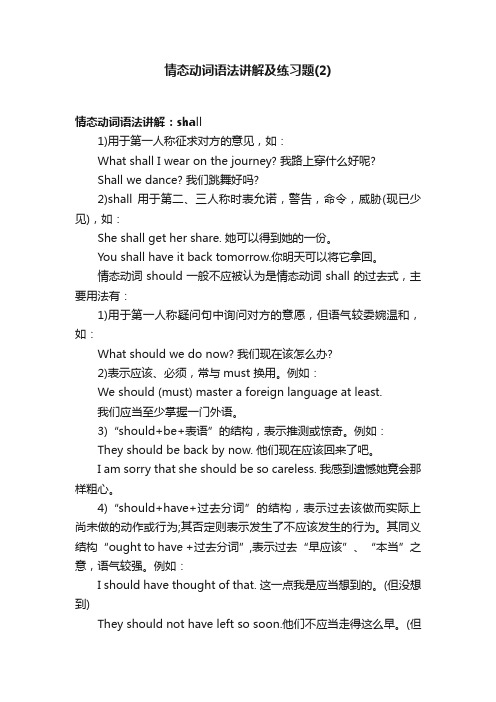
情态动词语法讲解及练习题(2)情态动词语法讲解:shall1)用于第一人称征求对方的意见,如:What shall I wear on the journey? 我路上穿什么好呢?Shall we dance? 我们跳舞好吗?2)shall 用于第二、三人称时表允诺,警告,命令,威胁(现已少见),如:She shall get her share. 她可以得到她的一份。
You shall have it back tomorrow.你明天可以将它拿回。
情态动词should一般不应被认为是情态动词shall的过去式,主要用法有:1)用于第一人称疑问句中询问对方的意愿,但语气较委婉温和,如:What should we do now? 我们现在该怎么办?2)表示应该、必须,常与must 换用。
例如:We should (must) master a foreign language at least.我们应当至少掌握一门外语。
3)“should+be+表语”的结构,表示推测或惊奇。
例如:They should be back by now. 他们现在应该回来了吧。
I am sorry that she should be so careless. 我感到遗憾她竟会那样粗心。
4)“should+have+过去分词”的结构,表示过去该做而实际上尚未做的动作或行为;其否定则表示发生了不应该发生的行为。
其同义结构“ought to have +过去分词”,表示过去“早应该”、“本当”之意,语气较强。
例如:I should have thought of that. 这一点我是应当想到的。
(但没想到)They should not have left so soon.他们不应当走得这么早。
(但已走了)5) 在“It is natural (strange, natural, necessary, surprised, impossible, important ) that……”句型中,主语从句中的谓语动词要用should +动词原形”表示“理所当然”、“奇怪”、“必要”、“惊异”等的意思。
初中情态动词表的推测用法猜测及练习(经典)

初中情态动词表的推测用法猜测及练习(经典)在初中语法研究中,情态动词是一个重要的部分。
情态动词除了表示能力、可能性、允许性等含义外,还可用于表达推测。
本篇文档将介绍初中情态动词表的推测用法,并提供一些练。
情态动词表的推测用法猜测情态动词用于推测时,常常表示根据已有的信息或证据得出的合理猜测或推断。
以下是一些常见的情态动词及其推测用法:1. can: 表示推测,例如:"He can be at home."(他可能在家。
)can: 表示推测,例如:"He can be at home."(他可能在家。
)2. could: 表示推测,通常比can稍微更不确定,例如:"She could be busy."(她可能忙。
)could: 表示推测,通常比can稍微更不确定,例如:"She could be busy."(她可能忙。
)3. may/might: 表示推测,表示某种可能性,例如:"It may rain tomorrow."(明天可能会下雨。
)may/might: 表示推测,表示某种可能性,例如:"It may rain tomorrow."(明天可能会下雨。
)4. must: 表示根据已有的证据或情况必然发生的推测,例如:"He must be tired."(他一定很累。
)must: 表示根据已有的证据或情况必然发生的推测,例如:"He must be tired."(他一定很累。
)5. should: 表示合理的推测或建议,例如:"They should be here soon."(他们应该很快就到了。
)should: 表示合理的推测或建议,例如:"They should be here soon."(他们应该很快就到了。
(完整word版)情态动词表推测用法总结和专项练习,文档.doc
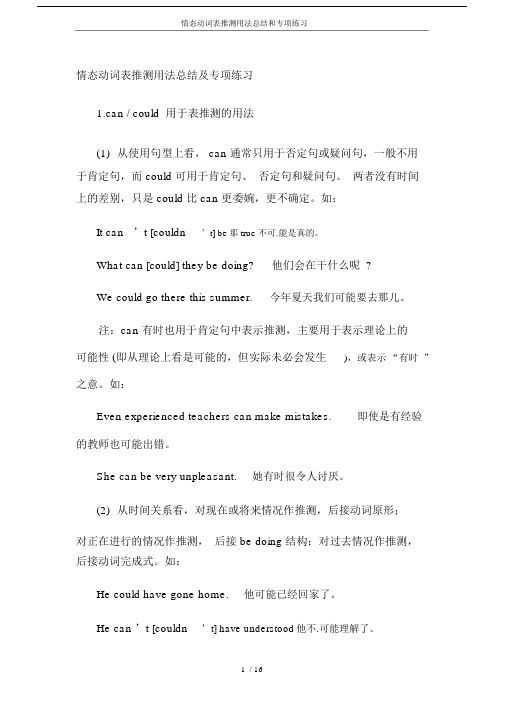
情态动词表推测用法总结和专项练习情态动词表推测用法总结及专项练习1.can / could 用于表推测的用法(1)从使用句型上看, can 通常只用于否定句或疑问句,一般不用于肯定句,而 could 可用于肯定句、否定句和疑问句。
两者没有时间上的差别,只是 could 比 can 更委婉,更不确定。
如:It can’t [couldn’t] be那true不可.能是真的。
What can [could] they be doing?他们会在干什么呢?We could go there this summer.今年夏天我们可能要去那儿。
注:can 有时也用于肯定句中表示推测,主要用于表示理论上的可能性 (即从理论上看是可能的,但实际未必会发生),或表示“有时”之意。
如:Even experienced teachers can make mistakes.即使是有经验的教师也可能出错。
She can be very unpleasant.她有时很令人讨厌。
(2)从时间关系看,对现在或将来情况作推测,后接动词原形;对正在进行的情况作推测,后接 be doing 结构;对过去情况作推测,后接动词完成式。
如:He could have gone home.他可能已经回家了。
He can ’t [couldn’t] have understood他不.可能理解了。
Why does he know this? Can [Could] someone have told him about it?他怎么知道?会是哪个人告诉他了吗?(3)“could+完成式”除表示对过去的推测外,还有以下重要用法:① 表示过去没有实现的可能性,常译为“本来可以”。
如:I could have lent you the money.Why didn’t you ask me?我本来可以借这笔钱给你的。
你为什么不向我提出?② 用来委婉地责备某人过去应该做某事而没有去做,常译为“本来应该”。
初中情态动词表的用法推测及练习(经典)

初中情态动词表的用法推测及练习(经典)本文档旨在提供初中学生关于情态动词用法推测及练方面的指导。
下方是一份经典的初中情态动词表,供学生参考和练。
用法推测Can / Could- 表示能力或可能性:He [can/could] swim very fast. (他会游泳很快。
)- 表示请求或允许:[Can/Could] you help me with the homework? (你能帮我做作业吗?)May / Might- 表示可能性或允许:We [may/might] go to the ___(我们明天可能去公园。
)- 表示推测或建议:He [may/might] be late for the meeting. (他可能会迟到开会。
)___- 表示将来的行为:I [shall/should] ___我这个周末会去看望我祖父母。
)- 表示义务或建议:You [should] study hard for the exam. (你应该为考试而努力研究。
)Will / Would- 表示将来的行动或意愿:He [will/would] buy a new car. (他想买一辆新车。
)- 表示请求或邀请:[Will/Would] you please pass me the salt? (请你把盐递给我好吗?)Must- 表示必须性或推测:I [must] ___ before going out. (我必须在出门之前完成作业。
)- 表示肯定的推测:He [must] be tired after running for so long. (他跑了这么久肯定累了。
)___- 表示应该或建议:You [ought to] apologize to your friend. (你应该向你的朋友道歉。
)练根据上述情态动词的用法推测,完成以下句子:1. I __________ swim when I was five years old. (我五岁的时候能游泳。
情态动词表推测用法总结及专项练习

情态动词表推测用法总结及专项练习情态动词表推测用法总结及专项练习1.can / could用于表推测的用法(1) 从使用句型上看,can 通常只用于否定句或疑问句,一般不用于肯定句,而could 可用于肯定句、否定句和疑问句。
两者没有时间上的差别,只是could 比 can 更委婉,更不确定。
如:It can’t [couldn’t] be true. 那不可能是真的。
What can [could] they be doing? 他们会在干什么呢?We could go there this summer. 今年夏天我们可能要去那儿。
注:can 有时也用于肯定句中表示推测,主要用于表示理论上的可能性(即从理论上看是可能的,但实际未必会发生),或表示“有时”之意。
如:Even experienced teachers can make mistakes. 即使是有经验的教师也可能出错。
She can be very unpleasant. 她有时很令人讨厌。
(2) 从时间关系看,对现在或将来情况作推测,后接动词原形;对正在进行的情况作推测,后接 be doing 结构;对过去情况作推测,后接动词完成式。
如:He could have gone home. 他可能已经回家了。
He can’t [couldn’t] have understood. 他不可能理解了。
Why does he know this? Can [Could] someone have told him about it? 他怎么知道? 会是哪个人告诉他了吗?(3) “could+完成式”除表示对过去的推测外,还有以下重要用法:①表示过去没有实现的可能性,常译为“本来可以”。
如:I could have lent you the money.Why didn’t you ask me? 我本来可以借这笔钱给你的。
你为什么不向我提出?②用来委婉地责备某人过去应该做某事而没有去做,常译为“本来应该”。
情态动词表推测的讲解及练习题 (2)
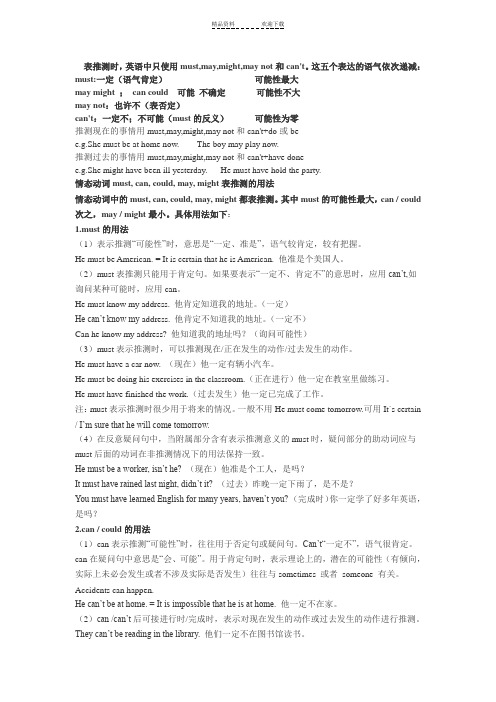
表推测时,英语中只使用must,may,might,may not和can't。
这五个表达的语气依次递减:must:一定(语气肯定)可能性最大may might ;can could 可能不确定可能性不大may not:也许不(表否定)can't:一定不;不可能(must的反义)可能性为零推测现在的事情用must,may,might,may not和can't+do或bee.g.She must be at home now. The boy may play now.推测过去的事情用must,may,might,may not和can't+have donee.g.She might have been ill yesterday. He must have hold the party.情态动词must, can, could, may, might表推测的用法情态动词中的must, can, could, may, might都表推测。
其中must的可能性最大,can / could 次之,may / might最小。
具体用法如下:1.must的用法(1)表示推测“可能性”时,意思是“一定、准是”,语气较肯定,较有把握。
He must be American. = It is certain that he is American. 他准是个美国人。
(2)must表推测只能用于肯定句。
如果要表示“一定不、肯定不”的意思时,应用can’t,如询问某种可能时,应用can。
He must know my address. 他肯定知道我的地址。
(一定)He can’t know my address. 他肯定不知道我的地址。
(一定不)Can he know my address? 他知道我的地址吗?(询问可能性)(3)must表示推测时,可以推测现在/正在发生的动作/过去发生的动作。
情态动词表推测用法总结及专项练习

情态动词表推测用法总结及专项练习第一篇:情态动词表推测用法总结及专项练习情态动词表推测用法总结及专项练习1.can / could用于表推测的用法(1)从使用句型上看,can 通常只用于否定句或疑问句,一般不用于肯定句,而could 可用于肯定句、否定句和疑问句。
两者没有时间上的差别,只是could 比 can 更委婉,更不确定。
如:It can’t [couldn’t] be true.那不可能是真的。
What can [could] they be doing? 他们会在干什么呢? We could go there this summer.今年夏天我们可能要去那儿。
注:can 有时也用于肯定句中表示推测,主要用于表示理论上的可能性(即从理论上看是可能的,但实际未必会发生),或表示“有时”之意。
如:Even experienced teachers can make mistakes.即使是有经验的教师也可能出错。
She can be very unpleasant.她有时很令人讨厌。
(2)从时间关系看,对现在或将来情况作推测,后接动词原形;对正在进行的情况作推测,后接 be doing 结构;对过去情况作推测,后接动词完成式。
如:He could have gone home.他可能已经回家了。
He can’t [couldn’t] have understood.他不可能理解了。
Why does he know this? Can [Could] someone have told him about it? 他怎么知道? 会是哪个人告诉他了吗?(3)“could+完成式”除表示对过去的推测外,还有以下重要用法:① 表示过去没有实现的可能性,常译为“本来可以”。
如: I could have lent you the money.Why didn’t you ask me? 我本来可以借这笔钱给你的。
情态动词表推测用法总结及专项练习
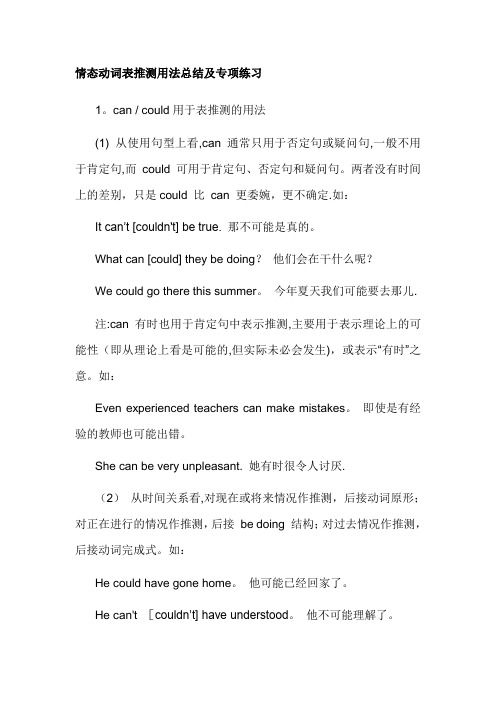
情态动词表推测用法总结及专项练习1。
can / could用于表推测的用法(1) 从使用句型上看,can 通常只用于否定句或疑问句,一般不用于肯定句,而could 可用于肯定句、否定句和疑问句。
两者没有时间上的差别,只是could 比can 更委婉,更不确定.如:It can’t [couldn't] be true. 那不可能是真的。
What can [could] they be doing?他们会在干什么呢?We could go there this summer。
今年夏天我们可能要去那儿.注:can 有时也用于肯定句中表示推测,主要用于表示理论上的可能性(即从理论上看是可能的,但实际未必会发生),或表示“有时”之意。
如:Even experienced teachers can make mistakes。
即使是有经验的教师也可能出错。
She can be very unpleasant. 她有时很令人讨厌.(2)从时间关系看,对现在或将来情况作推测,后接动词原形;对正在进行的情况作推测,后接be doing 结构;对过去情况作推测,后接动词完成式。
如:He could have gone home。
他可能已经回家了。
He can't [couldn’t] have understood。
他不可能理解了。
Why does he know this? Can [Could] someone have told him about it?他怎么知道?会是哪个人告诉他了吗?(3) “could+完成式”除表示对过去的推测外,还有以下重要用法:①表示过去没有实现的可能性,常译为“本来可以"。
如:I could have lent you the money.Why didn’t you ask me?我本来可以借这笔钱给你的。
你为什么不向我提出?②用来委婉地责备某人过去应该做某事而没有去做,常译为“本来应该"。
推测的情态动词总结及练习含答案高中英语北京海淀
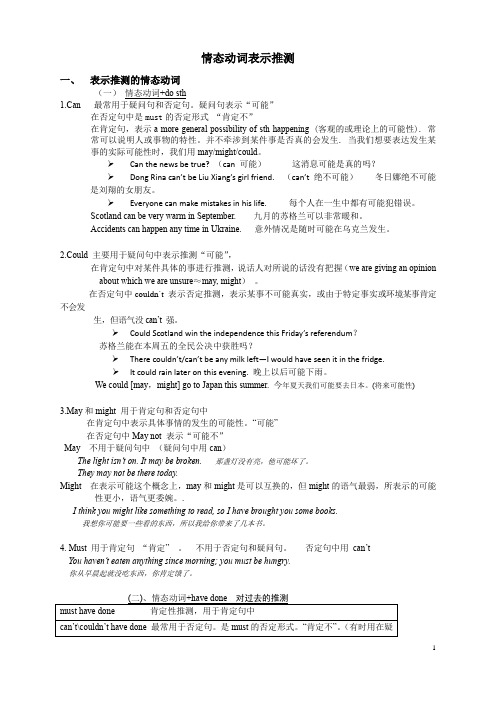
情态动词表示推测一、表示推测的情态动词(一)情态动词+do sth1.Can 最常用于疑问句和否定句。
疑问句表示“可能”在否定句中是must的否定形式“肯定不”在肯定句,表示a more general possibility of sth happening (客观的或理论上的可能性). 常常可以说明人或事物的特性。
并不牵涉到某件事是否真的会发生. 当我们想要表达发生某事的实际可能性时,我们用may/might/could。
➢Can the news be true? (can 可能)这消息可能是真的吗?➢Dong Rina can’t be Liu Xiang’s girl friend. (can’t 绝不可能)冬日娜绝不可能是刘翔的女朋友。
➢Everyone can make mistakes in his life. 每个人在一生中都有可能犯错误。
Scotland can be very warm in September. 九月的苏格兰可以非常暖和。
Accidents can happen any time in Ukraine. 意外情况是随时可能在乌克兰发生。
2.Could 主要用于疑问句中表示推测“可能”,在肯定句中对某件具体的事进行推测,说话人对所说的话没有把握(we are giving an opinionabout which we are unsure≈may, might)。
在否定句中couldn`t 表示否定推测,表示某事不可能真实,或由于特定事实或环境某事肯定不会发生,但语气没can’t 强。
➢Could Scotland win the independence this Friday’s referendum?苏格兰能在本周五的全民公决中获胜吗?➢There couldn’t/can’t be any milk left—I would have seen it in the fridge.➢It could rain later on this evening. 晚上以后可能下雨。
- 1、下载文档前请自行甄别文档内容的完整性,平台不提供额外的编辑、内容补充、找答案等附加服务。
- 2、"仅部分预览"的文档,不可在线预览部分如存在完整性等问题,可反馈申请退款(可完整预览的文档不适用该条件!)。
- 3、如文档侵犯您的权益,请联系客服反馈,我们会尽快为您处理(人工客服工作时间:9:00-18:30)。
表推测时,英语中只使用must,may,might,may not和can't。
这五个表达的语气依次递减:must:一定(语气肯定)可能性最大may might ;can could 可能不确定可能性不大may not:也许不(表否定)can't:一定不;不可能(must的反义)可能性为零推测现在的事情用must,may,might,may not和can't+do或bee.g.She must be at home now. The boy may play now.推测过去的事情用must,may,might,may not和can't+have donee.g.She might have been ill yesterday. He must have hold the party.情态动词must, can, could, may, might表推测的用法情态动词中的must, can, could, may, might都表推测。
其中must的可能性最大,can / could 次之,may / might最小。
具体用法如下:1.must的用法(1)表示推测“可能性”时,意思是“一定、准是”,语气较肯定,较有把握。
He must be American. = It is certain that he is American. 他准是个美国人。
(2)must表推测只能用于肯定句。
如果要表示“一定不、肯定不”的意思时,应用can’t,如询问某种可能时,应用can。
He must know my address. 他肯定知道我的地址。
(一定)He can’t know my address. 他肯定不知道我的地址。
(一定不)Can he know my address? 他知道我的地址吗?(询问可能性)(3)must表示推测时,可以推测现在/正在发生的动作/过去发生的动作。
He must have a car now. (现在)他一定有辆小汽车。
He must be doing his exercises in the classroom.(正在进行)他一定在教室里做练习。
He must have finished the work.(过去发生)他一定已完成了工作。
注:must表示推测时很少用于将来的情况。
一般不用He must come tomorrow.可用It`s certain / I’m sure that he will come tomorrow.(4)在反意疑问句中,当附属部分含有表示推测意义的must时,疑问部分的助动词应与must后面的动词在非推测情况下的用法保持一致。
He must be a worker, isn’t he? (现在)他准是个工人,是吗?It must have rained last night, didn’t it?(过去)昨晚一定下雨了,是不是?You must have learned English for many years, haven’t you? (完成时)你一定学了好多年英语,是吗?2.can / could的用法(1)can表示推测“可能性”时,往往用于否定句或疑问句。
Can’t“一定不”,语气很肯定。
can在疑问句中意思是“会、可能”。
用于肯定句时,表示理论上的,潜在的可能性(有倾向,实际上未必会发生或者不涉及实际是否发生)往往与sometimes 或者someone 有关。
Accidents can happen.He can’t be at home. = It is impossible that he is at home. 他一定不在家。
(2)can /can’t后可接进行时/完成时,表示对现在发生的动作或过去发生的动作进行推测。
They can’t be reading in the library. 他们一定不在图书馆读书。
He can’t have gone to Shanghai for I saw him a minute ago.他不可能去了上海,我刚才还看见他。
It’s so late. Where can she have gone? 天晚了,她可能去哪儿了呢?(3)在反意疑问句中,当陈述部分含有表示推测意义的can’t时,疑问部分的助动词应与can’t后面的动词在非推测情况下的用法保持一致.He can’t be a teacher, is he? 他不是教师,是吗?She can’t have finished her homework, has she? 她一定没有完成家庭作业,是不是?could可用于表示某事有可能发生表示可能性不大的推测。
意思相当于may/mightDon’t eat it. It could be poisonous. 不要吃它,可能有毒。
The plane could be delayed by fog. 飞机可能会因为雾晚点。
(5)could还可以用于表示客气、委婉、礼貌的请求语气。
Excuse me, could you tell me the way to the bus station?Could you help me?(6)couldn’t表示否定推测,表示某事不可能真实,或由于特定事实或环境某事肯定不会发生。
It couldn’t possibly be poison. 这不可能是毒药。
表示对过去发生的事推测,常常和have done 连用He was not at home last night . He could/ might have gone to movies.I didn't see her at the meeting yesterday; she couldn't have spoken at the meeting.3. may和might的用法(1)may, might表示推测“可能性”时,意思是“可能”、“也许”,语气没有must肯定。
He may / might be American. = It is possible that he is American.他可能是个美国人。
注:might不表示过去时态,只是语气上比may更委婉,表示的可能性更小。
(2)may, might表推测时,可以用于否定句,意思是“可能不、也许不”,但不用于疑问句。
He may / might not be at home. 他也许不在家。
(3)may, might可以推测现在正在发生的动作或过去发生的动作。
He may / might be sleeping now. (现在)他可能正在睡觉。
The boy may / might not be watching TV at home. (现在)这个男孩可能没在家看电视These students may / might have seen the film before.(过去)这些学生以前可能看过这部电影。
(4)may, might还可以推测将来的情况。
I think we should take raincoat with us, it may rain.我想我们应该带上雨衣,可能要下雨了。
She might not come this afternoon. 她今天下午可能不来一、单项选择1 John___ come to see us tonight, but he isn't very sure yet.A. mayB. needC. can’tD. must2 John isn’t in the classroom. H e _______ play soccer on the playground with Bob.A. canB. mustC. shouldD. can’t3 That _______not be her husband . She is still single.A. mayB.canC. couldD. might4 You___ go and see a doctor at once because you got a fever.A. canB. mustC. dareD. would5 -Can you speak Japanese? -No, I____.A. mustn'tB. can'tC. needn'tD. may not6 -He___ be in the classroom, I think.-No, he ___ be in the classroom. I saw him go home a minute ago.can; may not B. must; may not C. may; can't D. may; mustn't7 -Is Lena swimming in the pool?-No, she swim. She is terrified of water.A. may notB. must notC. can'tD. needn't8 He isn't at school. I think he ___ be ill.A. canB. shallC. mustD. might9 -What do you think “upset” means?- I’m not sure. It mean “sad”.may B. must C. can D. should10 The children___ play football on the road.can't B. canC. mustn'tD. must11.The road is wet . It ______last night.A must rainB must have rainedC could have rainedD can have rainedHe ______you more help , even though he was busy .A might have givenB might not giveC may not have givenD may give答案ABBBB CCDAA BA。
